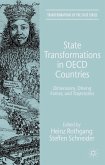Are we witnessing the decline of state involvement in education or is it being reshaped, and if so how? Surprisingly, this question has received little attention from researchers in education studies, sociology and political science.
This book aims to fill this gap by exploring school evaluation policies in four European countries: England, France, Scotland and Switzerland. It shows that the same policy tool - promoted in many European and international arenas concerned with good practice in educational governance - can actually give rise in each system to a variety of policy configurations in which forms of state control can differ. Written from a policy sociology perspective, the book aims to go beyond the decline/permanence dichotomy and proposes a specific conceptual framework within which to consider both contextualised forms of state intervention and their potential similarities and combinations. By doing this, the authors not only aim to counterbalance or supplement dominant views on the Europeanisation and transnationalisation of education policies but also to imagine new possibilities for state policy analysis.
This book aims to fill this gap by exploring school evaluation policies in four European countries: England, France, Scotland and Switzerland. It shows that the same policy tool - promoted in many European and international arenas concerned with good practice in educational governance - can actually give rise in each system to a variety of policy configurations in which forms of state control can differ. Written from a policy sociology perspective, the book aims to go beyond the decline/permanence dichotomy and proposes a specific conceptual framework within which to consider both contextualised forms of state intervention and their potential similarities and combinations. By doing this, the authors not only aim to counterbalance or supplement dominant views on the Europeanisation and transnationalisation of education policies but also to imagine new possibilities for state policy analysis.








